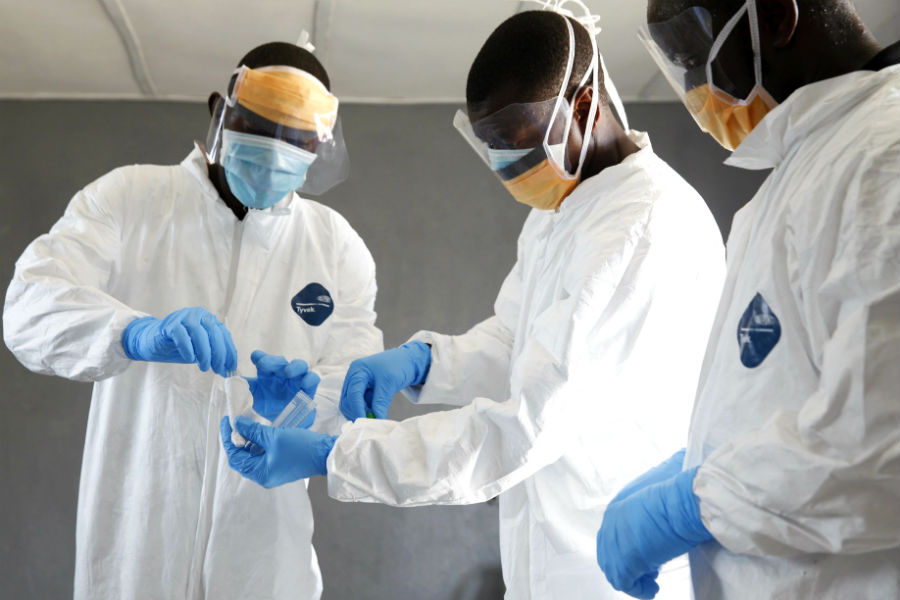
The 2019 Novel Coronavirus (2019-nCoV). (Image: CDC)
What is the coronavirus and how does its outbreak affect Africa?
On January 30, 2020, the World Health Organization (WHO) declared that the outbreak of a novel coronavirus (designated as covid-19) constituted a Public Health Emergency of International Concern. Coronaviruses are a family of viruses that cause Middle East Respiratory Syndrome (MERS), Severe Acute Respiratory Syndrome (SARS), and cold-like illnesses. This new virus first appeared in Wuhan in the Chinese province of Hubei.
The WHO’s emergency declaration was significantly driven by fears of the virus spreading to countries with weak health systems, particularly in Africa, which has widespread ties to China. Because of this risk, the WHO identified 13 African countries (Algeria, Angola, Côte d’Ivoire, Democratic Republic of the Congo, Ethiopia, Ghana, Kenya, Mauritius, Nigeria, South Africa, Tanzania, Uganda, and Zambia) as high priorities for support based on volume of travel from China. The U.S. Centers for Disease Control and Prevention stepped up partnerships with African health ministries, and the Bill & Melinda Gates Foundation committed $10 million to combat the outbreak—half to China and half to the Africa Centres for Disease Control and Prevention (Africa CDC), underscoring Africa’s importance for global containment. While vulnerable, Africa has abundant experience and expertise with epidemics.
How serious a threat does the coronavirus pose in Africa?
The respiratory illness caused by this new type of coronavirus has sickened more than 1.3 million people, of whom more than 76,000 have died. First detected in December 2019, the virus has swiftly spread around the world through travel and person-to-person transmission. More than 10,000 cases have been reported in 52 African countries: Algeria, Angola, Benin, Botswana, Burkina Faso, Burundi, Cabo Verde, Cameroon, Central African Republic, Chad, Côte d’Ivoire, Democratic Republic of the Congo, Djibouti, Egypt, Equatorial Guinea, Eritrea, Eswatini, Ethiopia, Gabon, The Gambia, Ghana, Guinea, Guinea-Bissau, Kenya, Liberia, Libya, Madagascar, Malawi, Mali, Mauritania, Mauritius, Morocco, Mozambique, Namibia, Niger, Nigeria, Republic of the Congo, Rwanda, Sao Tome and Principe, Senegal, Seychelles, Sierra Leone, Somalia, South Africa, South Sudan, Sudan, Tanzania, Togo, Tunisia, Uganda, Zambia, and Zimbabwe.*
Gauging how serious a threat the virus poses in Africa is difficult because much about it is still uncertain (including its infectiousness, fatality rate, and transmission patterns). Currently, this coronavirus’s fatality rate appears to be approximately 2 percent. By comparison, recent outbreaks of the Ebola virus have seen fatality rates of over 50 percent. Scientists also try to estimate a disease’s “reproduction number,” or R₀, to assess the number of people who are likely to be infected by a single contagious person. Estimates of the R₀ for the new coronavirus vary from 1.4-3.5. This compares to recent Ebola R₀’s of 1.5-2. Meanwhile, measles historically had R₀ rates of 12-18. Notably, outbreaks of both Ebola and measles are still ongoing in the Democratic Republic of the Congo and have claimed, respectively, over 2,200 and over 6,000 lives.

Researchers take a sample swab at C.H. Rennie Hospital in Kakata, Liberia. (Photo: World Bank/Dominic Chavez)
To further put this in perspective, Africa faces other profound health challenges that cause loss of life on a larger scale. In 2018, 96 new infectious disease outbreaks were reported across 36 countries in Africa, including cholera, yellow fever, measles, and Ebola. Moreover, in 2018, an estimated 470,000 people in Sub-Saharan Africa died from AIDS-related causes. In varying degrees, efforts to combat these diseases do receive substantial international resources (particularly HIV/AIDS), and Ebola was eventually designated as a Public Health Emergency of International Concern in August 2019, but, as more established health risks, these deadly diseases are not the subject today of the near-panic that coronavirus is arousing in some circles. Global attention is being driven by the unknowns of this newly emergent coronavirus, as well as the fact that it is apparently spread by airborne droplets, making it easier to transmit from person to person than some other infectious diseases.
The economic impacts from a disease, moreover, may not be linked to fatality or transmission rates. The 2003 SARS outbreak, for example, cost the global economy an estimated $40 billion. The number of cases from the new coronavirus has already outpaced SARS, and it is predicted to wreak even more economic havoc than SARS did.
Why might Africa be significantly impacted?
Sino-African ties are extensive, including trade, investment and finance, tourism, education, and security cooperation. There are more than 60,000 Africans studying in China. Thousands of African students studying in Wuhan have found themselves caught in the quarantine but cut off from consular services. Travel between China and Africa has also been drastically reduced, and many African airlines have canceled flights. Despite WHO requests to keep flights and borders open, many African countries have joined others around the world in restricting travel from China.
These developments and anticipated Chinese economic losses will affect commerce between China and Africa, as well as burgeoning tourism. Mauritius alone attracts 5,000 Chinese travelers a month. Producers of commodities such as copper will be affected by a downturn in Chinese manufacturing, which normally surges following the Lunar New Year celebration. African currencies and stock exchanges are also vulnerable. In previous global downturns, Africa had been somewhat insulated. However, expanded ties to China have increased exposure to such shocks, both human and economic.
What does the outbreak tell us about health security?
China’s response to this outbreak has both positive and negative aspects of relevance to Africa. The second largest economy in the world has stood up new hospitals but struggled to provide basic supplies, such as face masks. In most African countries, outbreak detection would likely take longer, limited laboratory capacity would hamper testing, and the provision of supplies would be more difficult. In China, epidemiologists have linked many of the first patients to the Huanan Seafood Wholesale Market, though questions remain about the virus’s origins. Africa too has seen the emergence of zoonotic diseases (crossing over from animals), and with increasing human settlement in forested areas, the ongoing bush meat trade, and a changing climate, it is likely to see new diseases emerge and known illnesses appear in unanticipated areas.
China’s experience reinforces the centrality of trust and transparency in public health.
China’s experience reinforces the centrality of trust and transparency in public health. While Chinese authorities have been more forthcoming with the WHO than they were with SARS, they did not alert the Chinese public of the outbreak until well into January, and medical doctors and others were pressured to remain quiet. This official silence was compounded by unofficial online speculation, with misinformation across social media networks alleging the virus was a bioweapon (it is not), that millions have been infected (they have not), and that the Gates Foundation predicted this outbreak (it did not). Similar rumors have impeded Ebola responses, and false information and conspiracy theories have become a global health challenge.
Another relevant issue is the role of security forces in responding to an outbreak. While security forces may have a part to play in the response to some health crises, they can also reduce the willingness of civilians to seek help. Consequently, security forces need to be deployed judiciously and under the guidance of health providers.
What should African countries do to respond to the outbreak?
The Africa CDC has activated its Emergency Operations Center and is obtaining test kits, preparing laboratory facilities, and working with member states to support infection prevention and control and with airlines on traveler screening. Given the number of countries elsewhere reporting infections, one or more African countries will likely join their ranks. Information, however, is a valuable currency for public health, and forewarned countries have a better chance to limit transmission through clear public communications and education for health practitioners. Standard recommendations to prevent the spread of respiratory viruses include washing hands with soap and water and covering one’s mouth and nose when coughing and sneezing.
This outbreak demonstrates the need to improve health security worldwide.
Strengthening laboratory and institutional capacity in Africa will yield dividends beyond the diagnostics for this virus, and will help African countries respond to future emerging diseases, whatever their source. Africa could become home to chains of coronavirus transmission, hence the efforts by the WHO, Africa CDC, and others to proactively respond to the current crisis. This outbreak also demonstrates, once again, the need to improve health security worldwide in line with achieving the goals of the international Global Health Security Agenda.
The economic consequences of the outbreak may well be more significant for Africa than the epidemiological impact. With China’s economic growth predicted to drop at least from 6.1 to 5.6 percent as a result of the coronavirus, African economies will also be affected. African countries thus must consider their economic responses as well as their health safeguards.
⇑ * As of April 7, 2020
Additional Resources
- WHO Coronavirus Situation Reports
- African Union and Africa Centres for Disease Control and Prevention Coronavirus Briefing
- U.S. Centers for Disease Control and Prevention Coronavirus Frequently Asked Questions
- Andrew Ziegler, “Will Africa Suffer Zika’s Bite?” Spotlight, Africa Center for Strategic Studies, September 1, 2016.
- Africa Center for Strategic Studies, “Lessons from the Joint Force Command’s Response to the Ebola Crisis,” Spotlight, December 5, 2014.
More on: COVID-19 Health & Security

